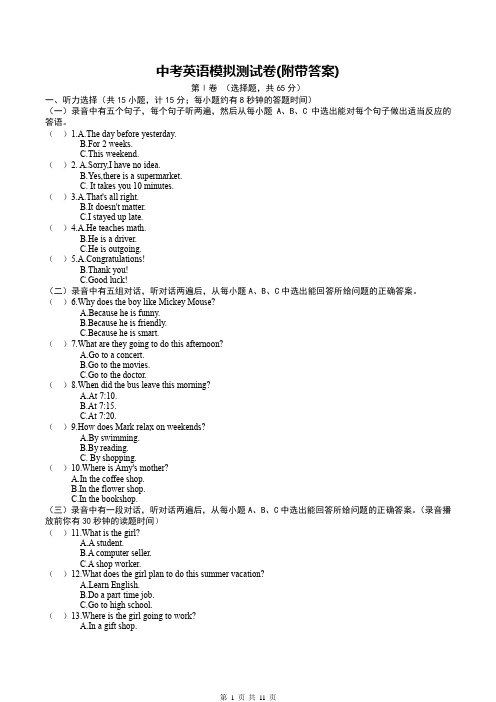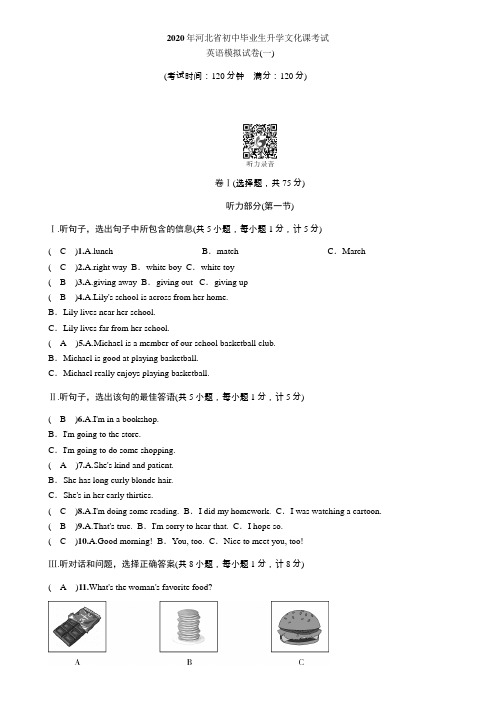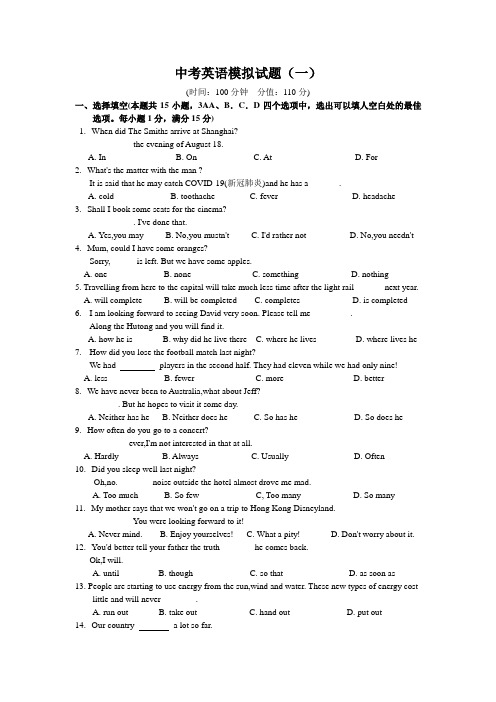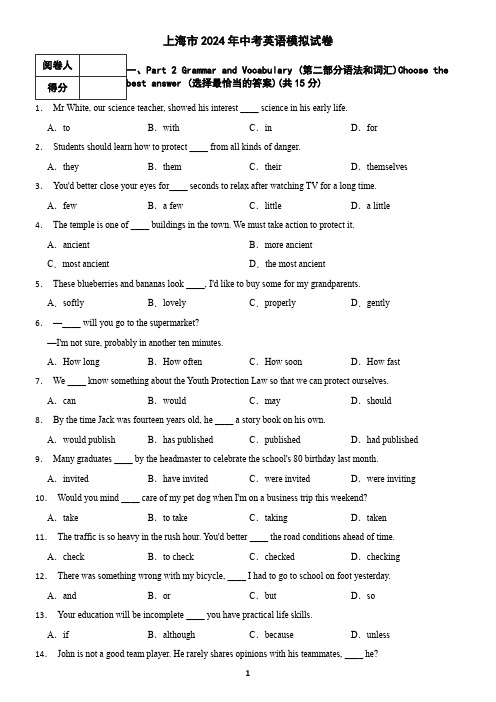中考英语模拟卷(一)
2023年湖北省武汉市武昌区中考英语模拟试卷(一)(解析版)

2023年湖北省武汉市武昌区中考英语模拟试卷(一)英语试题第一部分听力部分一、听力测试(共三节)第一节听下面5个问题或句子。
每个问题后有三个答语, 从题中所给的A、B、C三个选项中选出最佳选项。
听完每个问题后, 你都有5秒钟的时间来作答和阅读下一小题。
每个问题仅读一遍。
1. A. I think so. B. BoB. C. The nature.2. A. For six years. B. At 7:00. C. In 1996.3. A. Kung fu. B. In the newspaper. C. It was great.4. A. Shopping. B. A teacher. C. Very kind.第二节听下面7段对话。
每段对话后有一个小题, 从题中所给的A、B、C三个选项中选出最佳选项。
听完每段对话后, 你都有10秒钟的时间来作答有关小题和阅读下一小题每段对话仅读一遍。
5. What will the weather be like this weekend?A. Cloudy.B. Sunny.C. Rainy.6. How did Tom go to school today?A. By subway.B. By bike.C. By car.7. When will the girl have the English exam?A. On the 25th.B. On the 26th.C. On the 27th.8. What does the woman suggest buying?A. Cookies.B. A cake.C. Nothing.9. What time is it now?A. 4:45.B. 4:55.C. 5:15.10. What does the woman mean?A. She will help the man with the problem.B. She is good at maths.C. She can't figure out the problem, either.11. What do we know about the speakers?A. They will go to the graduation party.B. They went to the same party some time ago.C. They are discussing when to meet again.12. How will the man pay for the shirt and tie?A. B. C.第三节听下面4段对话或独白。
中考英语模拟测试卷(附带答案)

中考英语模拟测试卷(附带答案)第Ⅰ卷(选择题,共65分)一、听力选择(共15小题,计15分;每小题约有8秒钟的答题时间)(一)录音中有五个句子,每个句子听两遍,然后从每小题A、B、C中选出能对每个句子做出适当反应的答语。
()1.A.The day before yesterday.B.For 2 weeks.C.This weekend.()2. A.Sorry,I have no idea.B.Yes,there is a supermarket.C. It takes you 10 minutes.()3.A.That's all right.B.It doesn't matter.C.I stayed up late.()4.A.He teaches math.B.He is a driver.C.He is outgoing.()5.A.Congratulations!B.Thank you!C.Good luck!(二)录音中有五组对话,听对话两遍后,从每小题A、B、C中选出能回答所给问题的正确答案。
()6.Why does the boy like Mickey Mouse?A.Because he is funny.B.Because he is friendly.C.Because he is smart.()7.What are they going to do this afternoon?A.Go to a concert.B.Go to the movies.C.Go to the doctor.()8.When did the bus leave this morning?A.At 7:10.B.At 7:15.C.At 7:20.()9.How does Mark relax on weekends?A.By swimming.B.By reading.C. By shopping.()10.Where is Amy's mother?A.In the coffee shop.B.In the flower shop.C.In the bookshop.(三)录音中有一段对话,听对话两遍后,从每小题A、B、C中选出能回答所给问题的正确答案。
中考英语复习英语模拟试卷(一)

2020年河北省初中毕业生升学文化课考试英语模拟试卷(一)(考试时间:120分钟满分:120分)卷Ⅰ(选择题,共75分)听力部分(第一节)Ⅰ.听句子,选出句子中所包含的信息(共5小题,每小题1分,计5分)(C)1.A.lunch B.match C.March (C)2.A.right way B.white boy C.white toy(B)3.A.giving away B.giving out C.giving up(B)4.A.Lily's school is across from her home.B.Lily lives near her school.C.Lily lives far from her school.(A)5.A.Michael is a member of our school basketball club.B.Michael is good at playing basketball.C.Michael really enjoys playing basketball.Ⅱ.听句子,选出该句的最佳答语(共5小题,每小题1分,计5分)(B)6.A.I'm in a bookshop.B.I'm going to the store.C.I'm going to do some shopping.(A)7.A.She's kind and patient.B.She has long curly blonde hair.C.She's in her early thirties.(C)8.A.I'm doing some reading. B.I did my homework. C.I was watching a cartoon.(B)9.A.That's true. B.I'm sorry to hear that. C.I hope so.(C)10.A.Good morning! B.You, too. C.Nice to meet you, too!Ⅲ.听对话和问题,选择正确答案(共8小题,每小题1分,计8分)(A)11.What's the woman's favorite food?(B)12.What will the speakers do?(B)13.Where was the woman at 2:30 yesterday?A.In a hotel. B.In the kitchen. C.In a taxi. —————————————————————————————————————————————(C)14.Who is Mrs.Jones?A.Joe and Leo's neighbor. B.Joe and Leo's mother. C.Joe and Leo's teacher.(B)15.What would Joe and Leo never do again?A.Tell lies. B.Make noise. C.Fight. —————————————————————————————————————————————(A)16.Where are the speakers?A.At home. B.In a hotel. C.In a restaurant.(B)17.What's Sam's favorite food?A.Bread. B.Chicken sandwiches. C.Vegetable sandwiches.(B)18.What did Sam's father do last night?A.He visited his friend. B.He attended a party. C.He watched a soccer game.Ⅳ.听短文和问题,选择正确答案(共7小题,每小题1分,计7分)(C)19.Who is Sam?A.Bill's brother. B.Bill's friend. C.Bill's cousin.(C)20.What was Sam like two years ago?A.He was outgoing. B.He was taller than Bill. C.He had a child's voice.(B)21.What's Sam going to be in the future?A.An artist. B.A scientist. C.A pianist. —————————————————————————————————————————————(A)22.Where were Ms.Fox's car keys?A.In a basket. B.On the sofa. C.Under a book.(C)23.What did Ms.Fox see on her desk?A.A book. B.A card. C.A note.(C)24.Why did Ms.Fox laugh?A.Because she received a special gift.B.Because her boss wasn't angry with her.C.Because she had worn unpaired shoes.(B)25.How was Ms.Fox's day?A.Boring. B.Awful. C.Fantastic.笔试部分Ⅴ.单项选择(共10小题,每小题1分,计10分)选出可以填入空白处的最佳选项。
中考英语模拟试题(一)(含答案)

中考英语模拟试题(一)(时间:100分钟分值:110分)一、选择填空(本题共15小题,3AA、B.C.D四个选项中,选出可以填人空白处的最佳选项。
每小题1分,满分15分)1.--When did The Smiths arrive at Shanghai?-- ________ the evening of August 18.A. InB. OnC. AtD. For2.--What's the matter with the man ?--It is said that he may catch COVID-19(新冠肺炎)and he has a_______.A. coldB. toothacheC. feverD. headache3.--Shall I book some seats for the cinema?-- _________ . I've done that.A. Yes,you mayB. No,you mustn'tC. I'd rather notD. No,you needn't4.--Mum, could I have some oranges?--Sorry, _____ is left. But we have some apples.A. oneB. noneC. somethingD. nothing5. Travelling from here to the capital will take much less time after the light rail ______ next year.A. will completeB. will be completedC. completesD. is completed6. --I am looking forward to seeing David very soon. Please tell me_________.--Along the Hutong and you will find it.A. how he isB. why did he live thereC. where he livesD. where lives he7. --How did you lose the football match last night?--We had players in the second half. They had eleven while we had only nine!A. lessB. fewerC. moreD. better8.--We have never been to Australia,what about Jeff?-- _____. But he hopes to visit it some day.A. Neither has heB. Neither does heC. So has heD. So does he9.--How often do you go to a concert?-- ________ ever,I'm not interested in that at all.A. HardlyB. AlwaysC. UsuallyD. Often10.--Did you sleep well last night?--Oh,no. _______ noise outside the hotel almost drove me mad.A. Too muchB. So few C, Too many D. So many11.--My mother says that we won't go on a trip to Hong Kong Disneyland.-- ________ You were looking forward to it!A. Never mind.B. Enjoy yourselves!C. What a pity!D. Don't worry about it.12.--You'd better tell your father the truth _______ he comes back.--Ok,I will.A. untilB. thoughC. so thatD. as soon as13. People are starting to use energy from the sun,wind and water. These new types of energy costlittle and will never________.A. run outB. take outC. hand outD. put out14.--Our country a lot so far.--Yes. I hope it will be evenA. has changed;wellB. changed;goodC. has changed;betterD. changed;better15.--I'm afraid I have to give up my dream of being a singer.-- . No dream is too big,and no dreamer is too small.A. Don't lose heartB. No problemC. That's unusualD. You must be joking二、完形填空(本题共15小题,根据短文内容,从各题所给的A、B、C、D四个选项中选出最佳选项。
淮安市中考英语模拟试题1

江苏省淮安市中考模拟试卷(一)英语试题命题:辜从林本卷满分120分,考试时间120分钟第Ⅰ卷(选择题共55分)一、单项选择(共15小题;每小题1分,满分15分)( ) 1. Amy _____ the blue clothes _____ the yellow ones.A. prefer; toB. prefers; toC. prefer; thanD. prefers; than ( ) 2. We do n’t know ______ next.A. how to doB. to do howC. what to doD. to do what ( ) 3. Y ou’d better _____ to the park today. It is raining outside.A. not to goB. not goC. to goD. don’t go ( ) 4. Be sure to get there on time, _____?A. mustn’t youB. aren’t youC. don’t youD. will you ( ) 5. Not only she but also I _____interested in Maths.A. isB. areC. amD. be( ) 6. Please remember _____ your lovely daughter here next time.A. to bringB. to takeC. takingD. bringing ( ) 7 I was born _____ the evening _____ March 12, 1967.A. in; ofB. in; inC. on; ofD. on; in. ( ) 8. Suddenly, I heard someone _____ for help out of the window.A. cryingB. cryC. criesD. to cry( ) 9. We are asking anyone who saw _____ last night to contact us.A. anything unusualB. unusual anythingC. something unusualD. unusual something( ) 10. My mother _____ a teacher.A. hopes me to becomeB. whishes me to becomeC. hopes that I becameD. wishes that I will become ( ) 11. They said they _____ to visit the Summer Palace the next week.A. will visitB. was goingC. had goneD. would go ( ) 12. This dish smells _____.A. goodB. wellC. betterD. fine( ) 13. Thanks for __________ the new chairperson.A. recommend me asB. recommending me asC. recommend me forD. recommending me for( ) 14. It’s selfish _____ him _____ the cakes with others.A. for; to shareB. of; not shareC. for; not sharingD. of; not to share ( ) 15. --- What a hard life my parents live!--- So do my parents.When I grow up,I ______ to make them live more happily.A.try B.tried C.will try D.have tried 二、完形填空(共15小题,每小题1分,满分15分)阅读下文,掌握其大意,然后从各题所给的四个选项中选出一个最佳答案。
上海市2024年中考英语模拟试卷(含答案)1

上海市2024年中考英语模拟试卷Part 2 Grammar and Vocabulary (第二部分语法和词汇)Choose the选择最恰当的答案)(共15分)1.Mr White, our science teacher, showed his interest ____ science in his early life.A.to B.with C.in D.for2.Students should learn how to protect ____ from all kinds of danger.A.they B.them C.their D.themselves3.You'd better close your eyes for____ seconds to relax after watching TV for a long time.A.few B.a few C.little D.a little4.The temple is one of ____ buildings in the town. We must take action to protect it.A.ancient B.more ancientC.most ancient D.the most ancient5.These blueberries and bananas look ____, I'd like to buy some for my grandparents.A.softly B.lovely C.properly D.gently6.—____ will you go to the supermarket?—I'm not sure, probably in another ten minutes.A.How long B.How often C.How soon D.How fast7.We ____ know something about the Youth Protection Law so that we can protect ourselves.A.can B.would C.may D.should8.By the time Jack was fourteen years old, he ____ a story book on his own.A.would publish B.has published C.published D.had published 9.Many graduates ____ by the headmaster to celebrate the school's 80 birthday last month.A.invited B.have invited C.were invited D.were inviting 10.Would you mind ____ care of my pet dog when I'm on a business trip this weekend?A.take B.to take C.taking D.taken11.The traffic is so heavy in the rush hour. You'd better ____ the road conditions ahead of time.A.check B.to check C.checked D.checking12.There was something wrong with my bicycle, ____ I had to go to school on foot yesterday.A.and B.or C.but D.so13.Your education will be incomplete ____ you have practical life skills.A.if B.although C.because D.unless14.John is not a good team player. He rarely shares opinions with his teammates, ____ he?A.is B.isn't C.does D.doesn't15.The little boy picked up the money and handed it to the police officer. ____ honest boy he is!A.How B.What C.What a D.What anPart 2 Grammar and Vocabulary (第二部分语法和词汇) (共8分)Complete the following passage with the words or phrases in the box. Each can only be used once (将下列单词或短语填入空格。
人教版九年级英语中考模拟卷(附答案) (1)
人教版九年级英语中招模拟卷(一)时间:100分钟满分:120分一、听力理解(20小题, 每小题1分, 共20分)第一节听下面5段对话。
每段对话后有一个小题, 从题中所给的A、B、C三个选项中选出最佳答案。
每段对话读两遍。
1. Who will be the owner of the book?A. The boy.B. The boy's mother.C. Tom.2. What did Jane do yesterday?A. She went to the Disneyland.B. She looked after her mom.C. She went shopping.3. When will the woman get her order of milk?A. On Thursday.B. On Friday.C. On Saturday.4. How much does a ticket cost?A. $10.B. $20.C. $40.5. What does the man want to buy?A. B. C.第二节听下面几段对话或独白。
每段对话或独白后有几个小题, 从题中所给的A、B、C 三个选项中选出最佳答案。
每段对话或独白读两遍。
听下面一段对话, 回答第6至第7两个小题。
6. What was the speech about?A. The science.B. The health.C. The environment.7. Who did Marie come here with?A. Mike.B. Mike's brother.C. Her brother. 听下面一段对话, 回答第8至第9两个小题。
8. What did Mary do at the party?A. She sang a song.B. She danced.C. She played the violin.9. When did Daniel leave the party?A. At 11:00.B. At 11:30.C. At 12:00. 听下面一段独白, 回答第10至第12三个小题。
中考英语模拟考试卷(附带答案)
中考英语模拟考试卷(附带答案)( 满分:120 分;考试时间:120分钟)第Ⅰ卷(选择题,共65分)一、听力选择(共 15 小题,计 15 分;每小题约有 8 秒钟的答题时间)(一)录音中有五个句子,每个句子听两遍,然后从每小题 A 、B 、C 中选出能对每个句子做出适当反应的答语。
1. A. 39.5 yuan. B. 39.5 kilos. C. 39.5 meters.2. A. It‟s really tall. B. Yes, I do. C. Sounds crazy but good!3. A. At the airport. B. At 8:30. C. She was late.4. A. Hurry up! B. Have a try! C. Thank you!5. A. Juice, coffee and cola.B. Math, English and history.C. Doctors, policemen and actors.(二)录音中有五组对话,听对话两遍后,从每小题 A 、B 、C 中选出能回答所给问的正确答案。
6. Who is the woman with long hair?A. The boy‟s aunt.B. The boy‟s teacher.C. The boy‟s mother.7. What did Maria spend the whole night doing?A. Writing her report.B. Sleeping.C. Studying for the test.8. What are the flowers made of?A. Plastic.B. Paper.C. Silk.9. What kind of teachers does Peter like?A. The ones who are friendly.B. The ones who are strict.C. The ones who understand him.10. What does Kate remember about Grade 6?A. Being a volunteer.B. Her art lessons.C. Her dance lessons.(三)录音中有一段对话,听对话两遍后,从每小题 A 、B 、C 中选出能回答所给问题的正确答案。
中考英语模拟考试卷(附带有答案)
中考英语模拟考试卷(附带有答案)(满分:120分;考试时间:120分钟)第I卷选择题(共65分)一、听力选择(共 15 小题,计 15 分;每小题约有 8 秒钟的答题时间)(一)录音中有五个句子,每个句子听一遍,然后从每小题A、B、C中选出能对每个句子做出适当反应的答语。
1. A. Me too. B. Me neither. C. But I have.2. A. By working with a group. B. Yes, I do. C. Take it easy.3. A. Yes, he was. B. Yes, he is. C. Yes, he did.4. A. I agree. B. Yes, they shouldn’t. C. No, they shouldn’t.5. A. I enjoy it a lot.B. It comes from his diaries.C. It was written for Chinese readers.(二) 录音中有五组对话,听对话两遍后,从每小题 A、B、C 中选出能回答所给问题的正确答案。
6. What did Tina use to be afraid of?A. Dogs.B. Cats.C. Pigs.7. Who does the guitar belong to?A. It belongs to Jack.B. It belongs to Jack’s brother.C. It belongs to Jack’s sister.8. What volunteer work would Lisa like to do?A. To help clean up the city park.B. To help kids with their study.C. To help give out food to homeless kids.9. What kind of people do guide dogs help?A. Doctors.B. The deaf.C. The blind.10. Why was John late for school this morning?A. Because he went to bed late.B. Because he missed the school bus.C. Because he woke up late.(三)录音中有一段对话,听对话两遍后,从每小题A、B、C中选出能回答所给问题的正确答案。
中考模拟1试题英语
中考模拟1试题英语Part 1A. 选择最佳答案1. What’s your name?A. Yes, I am.B. My name is Peter.C. I’m 14 years old.2. Where does your father work?A. In a hospital.B. Yes, he does.C. He is a teacher.3. How many students are there in your class?A. Yes, there are.B. There are 45.C. On the right.4. Can I borrow your pen?A. Yes, I can.B. Certainly.C. A big one.5. Would you like some tea?A. Yes, please.B. No, thank you.C. It’s white.B. 完形填空阅读短文,从每题所给的A、B、C 三个选项中选出一个最佳答案。
One day a monkey was 6 under a tree. He saw a banana peel on a tree.He smiled and 7 to eat it. But at that time a little fox saw the monkey. He 8to catch the monkey. The monkey climbed higher and higher but the fox continued chasing(追). At last the 9 could not catch the monkey. The monkey was 10 and felt very tired. When the monkey went down the tree, hesaid to the fox, “I am hungry. Why did you chase me?” The fox just smiled and said, “I am sorry. I saw your long tail and thought you were a banana.” The monkey 11 , “My tail is long, but a banana is longer.”6. A. playing B. climbing C. walking7. A. forgot B. stopped C. began8. A. began B. refused C. decided9. A. dog B. fox C. bird10. A. sorry B. happy C. sorry11. A. answered B. asked C. talkedC. 阅读理解从所给 A、B、C 三个选项中选出一个最佳答案。
- 1、下载文档前请自行甄别文档内容的完整性,平台不提供额外的编辑、内容补充、找答案等附加服务。
- 2、"仅部分预览"的文档,不可在线预览部分如存在完整性等问题,可反馈申请退款(可完整预览的文档不适用该条件!)。
- 3、如文档侵犯您的权益,请联系客服反馈,我们会尽快为您处理(人工客服工作时间:9:00-18:30)。
中考模拟卷(一)限时: 120分钟满分: 100分听力部分(20分)一、听对话,选择与对话内容相符的图片。
每段对话读两遍(每小题1分,共5分)1. A. B. C.2. A. B. C.3. A. B. C.4. A. B. C.5. A. B. C.二、听对话或独白,选择最佳选项。
每段对话读两遍(每小题1分,共8分)请听一段对话,完成第6至7小题6. What does the man want to buy?A. A coat.B. A T-shirt.C. A jacket.7. What color does the man like?A. Red.B. White.C. Blue.请听一段对话,完成第8至9小题8. How old is the girl's brother?A. Eight.B. Nine.C. Ten.9. What does the girl's dad do?A. A history teacher.B. A taxi driver.C. A fire fighter.请听一段对话,完成第10至11小题10. What sport did the boy do last week?A. Baseball.B. Ping pong.C. V olleyball.11. When will the speakers go to the sports center?A. Next Monday.B. Next Tuesday.C. Next Thursday. 请听一段对话,完成第12至13小题12. What does the boy think of the Super Summer Camp?A. He doesn't like it.B. He thinks it's good.C. He doesn't care about it.13. What can we learn from the conversation?A. The girl wants to join the camp.B. The boy's parents will go swimming.C. The boy is good at playing basketball.三、听短文,回答问题。
短文读两遍(每小题1分,共2分)请听一段短文,完成第14至15小题14. What can make Dad feel younger?A. Making a meal.B. Playing a game.C. Reading a book.15. What is the speaker mainly talking about?A. Where to spend Father's Day.B. How to choose a good gift for Dad.C. What to do with Dad on Father's Day.四、听短文,完成表格。
短文读两遍(每小题1分,共5分)笔试部分(100分)五、单项选择(每小题1分,共10分)21. Beijing is ________ capital of China, and it has ________ long history.A. the; anB. a; aC. the; aD. a; the22. —I am worried about ________ I can enter a good high school or not.—Take it easy. Believe in yourself!A. thatB. whenC. whetherD. where23. —A little bird entered through the open window to join us for dinner last night.—Wow, the unexpected guest ________ welcomed.A. will beB. must beC. won't beD. mustn't be24. This is the third film ________ has been shown in our school this term.A. thatB. whoC. whatD. whom25. Linda was busy when I went to see her yesterday. She ________ for an exam.A. will studyB. was studyingC. has studiedD. is studying26. —I'm so sorry about what happened yesterday.—Don't worry about it. It's never just one person's fault. We should think about ________ better next time.A. how can we do itB. how we can do itC. how can they do itD. how they can do it27. Several earthquakes have ________ around the world so far.A. taken care ofB. taken placeC. taken a restD. taken away28. Jerry will succeed in working out the problem ________ he gives up.A. ifB. becauseC. soD. unless29. The Nile is one of the ________rivers in the world.A. longB. longerC. longestD. most longest30. Many shops in China ________ to shut down as a new law against ivory(象牙)trade came into effect on January 1st, 2018.A. orderedB. didn't orderC. were orderedD. weren't ordered六、完形填空(每小题1分,共10分)Being street smart is an important skill to have and a good way to take care of yourself.Always carry your phone with you, but do not look at ________31 while you are walking. Being able to communicate or call for help is important, so keep a list of useful numbers. But put your phone away while you are walking so that you can keep your ________32 up and see what's going on around. If you do need to check your phone, ________33 and look at it quickly.Don't wear earphones ________34 you are out. If you have to ________35 something when you're out, use only one earphone or play it at very low volume(音量).Travel with ________36 or family members when possible and never go anywhere with a stranger. It's ________37to be careful with strangers. Remember not to get into a stranger's car if they call you over.________38 dark and out-of-the-way places. Do not take short cuts through dark areas, even if it will make your trip much faster. If you have to go to unsafe places, go ________39 someone you know or speak to someone over the phone while you are there.Run and shout if you feel unsafe. Run away as fast as you can towards a police station, hospital, or nearby business for ________40. Shout as loudly as you can to get the attention of people nearby.31. A. me B. it C. him D. her32. A. head B. nose C. hands D. arms33. A. walk B. run C. stop D. start34. A. though B. unless C. until D. while35. A. look for B. wait for C. listen to D. talk to36. A. parents B. brothers C. sisters D. friends37. A. important B. impossible C. boring D. interesting38. A. Find B. Avoid C. Visit D. Clean39. A. to B. for C. with D. without40. A. help B. drink C. money D. medicine七、阅读理解(每小题2分,共30分)AWe can't remember clearly since when we started to take our mobiles to a dinner table. This happens a lot, especially when we eat out. Once a dish comes, instead of lifting our chopsticks, we take out our mobiles and click. Later, we post the photos onto Weibo or WeChat, waiting to be “liked”. Then we check our mobiles from time to time during the meal, to see whether we get “liked” or not. We just cannot leave our mobiles for only a meal.Does that sound familiar to you? Do you do that often? If not, how do you feel when others do that when having dinner with you?A recent study suggests that what we are used to doing is not so good. Spending time taking photos of food makes the food less pleasant. To test this, some researchers did an experiment. Some people were asked to take photos before they could enjoy food. As a result, it showed that the more photos they took, ▲. So, why not stop taking photos and just enjoy the food in front of you?Besides the scientific result, there are also some other bad influences of taking photos of food before meals. After posting the photos onto the Internet, one will not be able to control himself and check his mobile many times. “Does everyone like my photos? I hope a lot of people like them!” It seems that your mobile secretly calls your name all the time, even when you are with real people.So, next time you go out to have dinner with your family or friends, how about not taking photos of food? Let the food be delicious as it is and share your life with people around you. Trust me, and it will be a wonderful time.41. From the passage, what happens a lot at the dinner table nowadays?A. People talk about their Weibo or WeChat.B. People learn from each other how to cook dishes.C. People like taking photos with friends or families.D. People take photos of food and post them before eating.42. Which of the following can be put in the ▲in Paragraph 3?A. the less cheerful they becameB. the less delicious the food seemed to themC. the more interested they were in the foodD. the more “liked” they got on Weibo or WeChat43. What does the fourth paragraph talk about?A. The reasons for checking your mobiles.B. The ways of posting the photos onto the Internet.C. The tips(提示) of making others like your photos on Weibo.D. Some other bad influences of taking photos of food before meals.44. Which of the following is the writer's opinion?A. We take our mobiles and click when a dish comes.B. We check our mobiles from time to time during the meal.C. Spending time taking photos of food makes the food less pleasant.D. Some people were asked to take photos before they could enjoy food.45. What can we learn from the passage?A. Take photos of food in order to have a wonderful life.B. Take photos of delicious food and share them with others.C. Remember to have dinner with our family and friends at home.D. Enjoy the life with people around us instead of taking photos of food.BEmma has just finished travelling alone in Europe. Are you interested in herjourney? Let's read some of her travel diaries.46. Emma was looking forward to this travel because ________.A. she had never taken a train ride beforeB. she could do anything she liked on the journeyC. she hoped to keep herself away from the busy life47. From the passage, we can know Salzburg is a great place for ________.A. enjoying classical musicB. buying children's booksC. visiting history museums48. In Amsterdam, she ________.A. climbed the beautiful mountainsB. travelled along the river in a boatC. wrote some postcards in her hotel49. She didn't need to worry about her safety in Copenhagen because ________.A. there was very little crime thereB. the city was full of friendly peopleC. she thought she was careful enough50. We can know that ________ from the passage.A. Emma has little interest in artB. Emma is a brave but careless girlC. Emma's travels were enjoyable and specialC阅读以下字典中的词条,根据其内容判断其后各个小题正、误。
